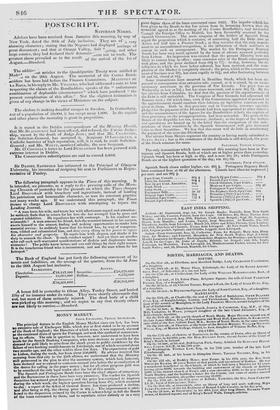The following paragraph appears in the Times of this morning.
It is intended, we presume, as a reply to the pressing calls of the Morn- ing Chronicle of yesterday for the grounds on which the Times charges Lord BROUGHAM with treachery and ingratitude, instead of lauding Iris patriotism and honourable character, as was its constant practice not many weeks ago. If we understand this paragraph, the 7'imes means to charge Lord BROUGHAM with attempting to injure the Leading Journal.
" A man loves his wife, and treats her with affectionate regard and attention : be suddenly finds that in return for his love she has wronged him by gross and repeated infidelities. He repudiates her with contempt. Is his conduct un- reasonable? A man esteems his friend, feels the warmest interest in his success, exerts himself to the utmost, finding and making opportunities to render him essential service : lie suddenly learns that his friend has, by way of compensa- tion, vilified and calumniated him, and done every thing in his power to injure his character and property. He repels him with disgust, and thinks it his duty to unmask the cheat. Is such conduct unjust ? And yet there are noodles who call such well-warranted manifestations of disdain and displeasure incon- sistencies! The public know better, and can call things by their right names. It is the treacherous friend who is inconsistent, and not the man whom he has betrayed."
















 Previous page
Previous page